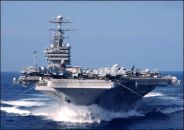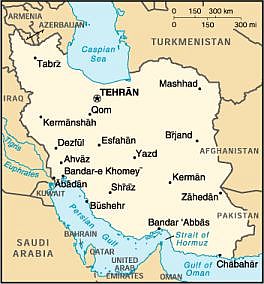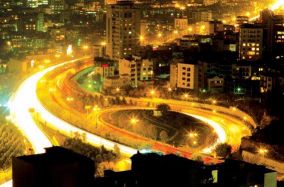|
The coming war against Iran - Part 15
By Daan de Wit
The Dutch in this article has been translated into English by Ben Kearney Using strong words and accusations to underscore their military build-up, the United States is gearing up to go to war with yet another country: Iran. Now that with every day passing a war with Iran is coming closer, all the parties involved are further entrenching themselves. It is a war that seemed to be inevitable from the start. Nobody wants it, except a few. History will show if these few will get what they are aiming for.
Rethoric and military action by U.S. builds up to war with Iran 'John Hannah, Vice President Cheney's national security adviser, said during a recent meeting that the administration considers 2007 "the year of Iran" and indicated that a U.S. attack was a real possibility', writes The Washington Post. The Guardian writes: 'The present military build-up in the Gulf would allow the US to mount an attack by the spring. But the sources said that if there was an attack, it was more likely next year, just before Mr Bush leaves office.' Veteran war reporter John Pilger writes: 'The United States is planning what will be a catastrophic attack on Iran. [...] I wrote virtually this same article early in 2003; for Iran now read Iraq then.' Ayatollah Ali Khamenei is threatening the U.S. in the event of an attack and Iran is drafting a shadow budget: '"We are preparing a shadow budget based on the oil price of under $30 per barrel in case an extraordinary incident happens on the international arena"'. Perhaps due to the anticipated consequences that an attack on Iran could have on the world oil market, the U.S. announced an effort to add to the Strategic Petroleum Reserve: 'the US Energy Department announced on Jan 23rd, a new push in the spring to fill the Strategic Petroleum Reserve with initial purchases of 11 million barrels. "In the spring, that is to say about two months from now, we will begin the fill.' The Sunday Telegraph writes: 'The build-up of anti-Iran rhetoric and despatch of two US aircraft carriers to the region has echoes for some of the run-up to the invasion of Iraq, prompting suspicions about the intentions of the remaining hawks within the administration, led  by the vice-president, Dick Cheney.' Le Figaro reported toward the end January: 'With the sending of the aircraft carrier USS John C. Stennis and its combat group to join the Dwight D. Eisenhower, already in the Gulf, the United States now has the ability to conduct an air offensive 24 hours a day for 30 or 40 days. It can rely on Bahrain, the huge al-Udaid airbase in Qatar and its operational command centre, and the Diego Garcia base in the Indian Ocean for supply. The American satellites have reportedly identified 1,500 targets linked to the Iranian nuclear weapon programme, distributed over 18 main sites. [...]'. 'Newsweek has learned that a third carrier will likely follow'; this might be the USS Ronald Reagan that has now entered the area where the USS Stennis is already present as a warning to Syria and Iran. Another troubling sign comes from insider Brzezinski who is taking the worst into consideration and is issuing a grave warning. by the vice-president, Dick Cheney.' Le Figaro reported toward the end January: 'With the sending of the aircraft carrier USS John C. Stennis and its combat group to join the Dwight D. Eisenhower, already in the Gulf, the United States now has the ability to conduct an air offensive 24 hours a day for 30 or 40 days. It can rely on Bahrain, the huge al-Udaid airbase in Qatar and its operational command centre, and the Diego Garcia base in the Indian Ocean for supply. The American satellites have reportedly identified 1,500 targets linked to the Iranian nuclear weapon programme, distributed over 18 main sites. [...]'. 'Newsweek has learned that a third carrier will likely follow'; this might be the USS Ronald Reagan that has now entered the area where the USS Stennis is already present as a warning to Syria and Iran. Another troubling sign comes from insider Brzezinski who is taking the worst into consideration and is issuing a grave warning.Brzezinski: false flag operation to provoke war with Iran Zbigniew Brzezinski, former National Security Advisor for President Carter, warned during testimony before the U.S. Senate Foreign Relations Committee that the U.S. is on the eve of war with Iran, possibly provoked by way of a false flag operation in which an attack on America will be blamed on Iran: 'If the United States continues to be bogged down in a protracted bloody involvement in Iraq, the final destination on this downhill track is likely to be a head-on conflict with Iran and with much of the world of Islam at large. A plausible scenario for a military collision with Iran involves Iraqi failure to meet the benchmarks; followed by accusations of Iranian responsibility for the failure; then by some provocation in Iraq or a terrorist act in the U.S. blamed on Iran; culminating in a "defensive" U.S. military action against Iran that plunges a lonely America into a spreading and deepening quagmire eventually ranging across Iraq, Iran, Afghanistan, and Pakistan.' Brzezinski knows what he's talking about. It was he who in the 1970's lured the Soviet Union into the 'Afghan trap' that he had laid. As a result of U.S. support for the Mujahedeen, the Soviets were seduced into invading Afghanistan: 'The day that the Soviets officially crossed  the border, I wrote to President Carter: We now have the opportunity of giving to the USSR its Vietnam war.' It's now the view in Washington that these Islamic fundamenalists (among them bin Laden and the Taliban) are the ones who ultimately turned against the U.S. Without laboring the point too much, the question remains as to what degree this is in fact the case, and as to how successful they've been. After all, it is unproven that the attacks on 9/11 were in fact carried out at the behest of Osama bin Laden, and there is overwhelming evidence that elements within the U.S. organized and carried out the attacks themselves. It looks like this same scenario was implemented during the attacks in London on 7/7. the border, I wrote to President Carter: We now have the opportunity of giving to the USSR its Vietnam war.' It's now the view in Washington that these Islamic fundamenalists (among them bin Laden and the Taliban) are the ones who ultimately turned against the U.S. Without laboring the point too much, the question remains as to what degree this is in fact the case, and as to how successful they've been. After all, it is unproven that the attacks on 9/11 were in fact carried out at the behest of Osama bin Laden, and there is overwhelming evidence that elements within the U.S. organized and carried out the attacks themselves. It looks like this same scenario was implemented during the attacks in London on 7/7.Brzezinksi knows all too well how, in times of conflict, all possible means are employed to achieve the goal. In his testimony before the Senate, he describes the lies and deceit during the run-up to the Iraq war, and warns us to be alert for subversive measures that could be employed to force a new war - this time with Iran. Ever since part 1 of this DeepJournal series on Iran, the writing has been on the wall that this war is going to become a reality. It's remarkable that an insider like Brzezinski offers such an insightful view into the realm in which these kinds of important issues are decided and orchestrated. It is an ominous sign. It has been largely ignored not only by the Dutch press, but also by the American press. This is a bad deal because it's the agenda as set forth by the mass media that in large part determines what is and is not deemed relevant and in turn incites our representatives to action. Without the major media to get the ball rolling, these kinds of crucial warnings will go unheard, and the representatives in Congress will continue to chase after the whim of the day. In so far as how a war with Iran could come to pass, Brzezinski said to the Senators: 'It could even be in some fashion provoked'. And: 'If one is of the view that one is dealing with an implacable enemy that has to be removed, that course of action may under certain circumstances be appealing. I'm afraid that if this situation in Iraq continues to deteriorate, and if Iran is perceived as in some fashion involved or responsible, or a potential beneficiary thereof, that temptation could arise'. The temptation that he is alluding to is the provoking of the enemy in order to force a pre-planned war. In order to illustrate this scenario with Iran, he quoted a newspaper article covering the run-up to the war with Iraq: '"I'll just read you what this memo allegedly says, according to the New York Times: 'The memo states that the president and the prime minister acknowledged that no unconventional weapons had been found inside Iraq [this is two months before the war]. Faced with the possibility of not finding any before the planned invasion, Mr. Bush talked about several ways to provoke a confrontation.' U.S. provokes Iran in order to force war One of these provocations may have been the recent kidnapping of the Iranian diplomat Jalal Sharafi by 'four Iraqis, who wore military uniforms and carried military identification cards, [they] were "not under the Ministry of Defense control, they were directly connected to the American control," said an Iranian Embassy official who spoke on condition of anonymity'. A better known example is the arrest of five Iranians 'in the process of being certified as diplomats' in Irbil, Northern Iraq. Another such potential provocation took place ten days later on January 20th in Karbala, when five American soldiers were murdered by men in 'American-style uniforms and weapons'. Iran is being openly suspected of being behind these acts: 'Tying Iran to the deadly attack could be helpful to the Bush administration, which has been engaged in an escalating war of words with Iran', writes The New York Times. But it appears from the same article that 'the attackers had carried forged American identity cards and American-style M-4 rifles and had thrown stun grenades of a kind used only by American forces here' and that when they fled they made use of 'at least five sport utility vehicles [and] advanced devices to monitor police communications and avoid the roads where the police were searching; what has caught the attention of investigators is the way the convoy of S.U.V.'s was able to give the impression that it was American and slip through Iraqi checkpoints unchallenged. [...] "We've got to be very careful as to who we define as our allies, and who we trust and who we don't," the military official said. "Was the governor involved? Were the Iraqi police that were on guard complicit or just incompetent?"' But let's not forget this question either: Were either the Americans or the British involved in this? Thanks to the Sunday Times we know that in the Greene Zone in Baghdad the British Joint Support Group (JSG) is active as a branch of the Task Force Black, alongside the SAS and the American Delta Force. The JSG is specialized in infiltration and deceptive strikes. The question is how much room they are afforded with which to interpet their task. 'President Bush last fall secretly authorized the killing or capture of Iranian intelligence operatives or Revolutionary Guard members operating in Iraq', writes The Washington Post. Meanwhile Defense Secretary Robert Gates has his doubts about Iranian involvement in the murders in Karbala: 'I haven't seen anything subsequent to that, to the effect that what I've seen is very ambiguous and does not provide any conclusive proof at this point.'. Military actions, pin-pricks and other provocations by the U.S. give the impression that they are trying to work Iran's nerves in the hope that it will eventually draw a response from the Iranians. 'At least one former White House official contends that some Bush advisers secretly want an excuse to attack Iran. "They intend to be as provocative as possible and make the  Iranians do something [America] would be forced to retaliate for," says Hillary Mann, the administration's former National Security Council director for Iran and Persian Gulf Affairs', writes Newsweek. The L.A. Times sees a 'heightened role of U.S. air power in the volatile region'. [...] "Air power plays major roles, and one of those is as a deterrent, whether it be in border control, air sovereignty or something more kinetic," said the senior Pentagon official, using a term that refers to offensive military action.' The Sunday Telegraph writes: 'The US has also increased flights of unmanned spy planes over the border corridor between Iraq and Iran, to track movements across the frontier to back up its claims about Teheran's behaviour. The drones were being flown into Iran from bases in Iraq to maintain a 24-hour check on a corridor running along "much" of the Iranian side of the border, an American intelligence officer told this newspaper.' '"I see three possibilities," explains an American observer based in Baghdad. "Either the White House is engaged in an aggressive strategy of containment, or it is punching in the dark, or it has set out on a new war." James Dobbins, director of the International Security and Defence Policy Centre at the Rand Corporation, feels, "It is not necessary to choose between these options: a combination of the three" could explain the current American gestures', writes Le Figaro. Iranians do something [America] would be forced to retaliate for," says Hillary Mann, the administration's former National Security Council director for Iran and Persian Gulf Affairs', writes Newsweek. The L.A. Times sees a 'heightened role of U.S. air power in the volatile region'. [...] "Air power plays major roles, and one of those is as a deterrent, whether it be in border control, air sovereignty or something more kinetic," said the senior Pentagon official, using a term that refers to offensive military action.' The Sunday Telegraph writes: 'The US has also increased flights of unmanned spy planes over the border corridor between Iraq and Iran, to track movements across the frontier to back up its claims about Teheran's behaviour. The drones were being flown into Iran from bases in Iraq to maintain a 24-hour check on a corridor running along "much" of the Iranian side of the border, an American intelligence officer told this newspaper.' '"I see three possibilities," explains an American observer based in Baghdad. "Either the White House is engaged in an aggressive strategy of containment, or it is punching in the dark, or it has set out on a new war." James Dobbins, director of the International Security and Defence Policy Centre at the Rand Corporation, feels, "It is not necessary to choose between these options: a combination of the three" could explain the current American gestures', writes Le Figaro.American arguments against Iran don't hold water Up until now the American actions appear to have been relatively ineffective at getting Iran to back down. And these actions would not have been necessary had the U.S. engaged in negotiations offered by Iran. Read more about this in part 13 of this series under the headline U.S. rejects offers for peace negotiations. 'Powell, for one, thinks Bush simply wasn't prepared to deal with a regime he thought should not be in power. As secretary of State he met fierce resistance to any diplomatic overtures to Iran and its ally Syria. "My position in the remaining year and a half was that we ought to find ways to restart talks with Iran," he says of the end of his term. "But there was a reluctance on the part of the president to do that"', reads Newsweek. 'The Guardian writes: 'Afshin Molavi, a fellow of the New America Foundation, said: "To argue diplomacy has not worked is false because it has not been tried. Post-90s and through to today, when Iran has been ready to dance, the US refused, and when the US has been ready to dance, Iran has refused. We are at a stage where Iran is ready to walk across the dance floor and the US is looking away."' The American actions would also tot have been necessary had there been more facts to report that would underscore the danger of Iran, especially in Iraq. But those facts aren't there. '[The] case against Iran is being built on insinuation, accusation and misinformation. Despite the stories that fill the news, we have yet to see any evidence that Iran poses a real and imminent threat to any nation, least of all the US or the UK', writes professor Abbas Edalat in his article Answering the Charges Against Iran. The headlines today say that Iran is to be held accountable for 170 killed Americans in Iraq, but Newsweek writes about the presented evidence: 'But if their job was to provide proof of Tehran's involvement in Iraq's bloodshed, they're unlikely to convince the doubters with what was shown Sunday.' 'U.S. can't prove Iran link to Iraq strife - Despite pledges to show evidence, officials have repeatedly put off presenting their case, headlines the L.A. Times at the beginning of this month. The most important argument, that Iran is well on its way to producing an atomic bomb, appears to be untenable according to The International Institute for Strategic Studies (IISS). But the somewhat less relevant argument is unprovable as well: 'Administration officials have long complained that Iran was supplying Shiite Muslim militants with lethal explosives and other materiel used to kill U.S. military personnel. But despite several pledges to make the evidence public, the administration has twice postponed the release', writes the L.A. Times. That also appears to be the case from a new 'National Intelligence Estimate (NIE) on Iraq [,...] representing the consensus view of all 16 U.S. intel agencies'. The appearance by then Secretary of State Powell at the UN is still a fresh memory, as witnessed by the reluctance to step forward with burdensome 'facts'. For the rest the build up to the build up to the coming war with Iran looks identical to the one against Iraq: '"It is absolutely parallel," says Philip Giraldi, a former C.I.A. counterterrorism specialist. "They're using the same dance steps—demonize the bad guys, the pretext of diplomacy, keep out of negotiations, use proxies. It is Iraq redux."', writes Vanity Fair. Former German foreign minister Joschka Fischer writes: 'The "new strategy" does not follow the advice of the Baker-Hamilton report, but harks back to the disastrous strategy of the neocons. Iran is now in the superpower's sights, and the U.S. approach brings to mind the preparatory phase of the Iraq war - down to the last detail.' Even though Iran has wisely refrained from a military reaction to the repeated American challenges, the rhetoric has not calmed down. Even though the Western press has exaggerated statements by Iranian President Ahmadinejad in ways he never intended, as explained in the most recent installment of this series by DeepJournal, Iran continues to toot its own horn. But according to The Observer, unjustly so: 'Boasts of a nuclear programme are just propaganda, say insiders'. In reading the article under this headline it becomes clear that Iran's nuclear program is in a bad shape: 'Despite Iran being presented as an urgent threat to nuclear non-proliferation and regional and world peace - in particular by an increasingly bellicose Israel and its closest ally, the US - a number of Western diplomats and technical experts close to the Iranian programme have told The Observer it is archaic, prone to breakdown and lacks the materials for industrial-scale production'. Economy Iran is in a bad shape - will ration gasoline It's not only oil production that finds itself in such bad shape - the production of gasoline is also in a terrible state. The country has hardly any refineries that can produce fuel; beginning with the start of the Iranian new year, March 21st, gasoline is going to be rationed so as to cut down on gasoline imports. Not only is 40% of Iran's total gasoline usage made up of imports -
DeepJournal
Sign up for the free mailing list. |
|
9 September 2013
Why is Syria under attack? - Part 4
‘Syria’ is about power, money, influence and energy
8 September 2013
Why is Syria under attack? - 3
Syria and Iran are like pieces on a geopolitical chessboard
7 September 2013
Why is Syria under attack? - Part 2
On the interests of the parties involved in the Syrian conflict and the role of the media
6 September 2013
Why is Syria under attack? - Part 1
Who is behind the chemical weapons attack in Syria?
1 April 2013
Albert Spits: Creëer je eigen financiële veiligheid
Beluister het interview
|




 60%
60%